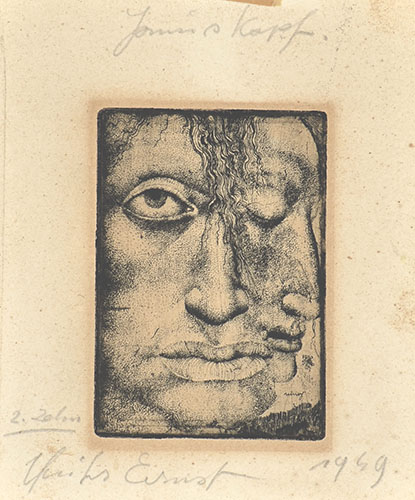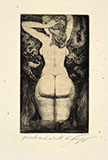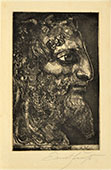(Vienna 1930 - 2019)
JANUS KOPF, 1949
Etching. A fine impression, titled annotated, signed and dated in pencil Janus Kopf / 2 zehn (edition 2 of ten) / Fuchs Ernst / 1949. To the platemark 88 x 62 mm, the full sheet 140 x 120.
Painter, draftsman, printmaker, sculptor, architect, stage designer, composer, poet, Fuchs was one of the founders of the "Viennese School of Fantastic Realism". Ernst was the only son of Maximilian and Leopoldine Fuchs. When the Nazis occupied Austria in March 1938, Maximilian, the son of an Orthodox Jewish family, emigrated to Shanghai. Ernst remained in Vienna with his mother. In 1942 Fuchs was baptized as a Catholic, an event of fundamental importance for him that determined his future life and work. He felt a calling to become an artist and began taking drawing, sculpture and painting lessons with Alois Schiemann. Later he received lessons from Professor Fröhlich and the sculptor Emmy Steinböck. He continued his studies with Professor Albert Paris von Gütersloh at the Vienna Academy of Art. There he encountered the work of Egon Schiele and Gustav Klimt. In 1948 he was instrumental in founding the "Vienna School of Fantastic Realism" together with Arik Brauer, Wolfgang Hutter, Rudolph Hausner and Anton Lehmden.
Ernst Fuchs settled in Paris where he remained for 12 years. After many years of misery and poverty he finally began to receive international recognition. Between 1952 and 1956 he traveled to England, Spain, Italy and an 18-month stay in the United States. In 1956 Fuchs moved to Israel where he lived in the Dormition Monastery on Mount Zion and painted icons. He devoted all his energies to promoting Judeo-Christian understanding and working as a church painter.
In 1974 he returned to Austria where he purchased Otto Wagner's villa in Vienna-Hütteldorf. He began working for film and stage, designing sets for the opera houses in Hamburg, Munich and Vienna. In 1988 he opened the Ernst Fuchs Private Museum. As a printmaker he produced several important cycles of prints. Fuchs continued to work in many media until his death.


